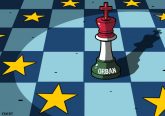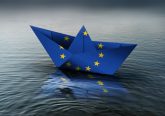As 25 of the EU’s 27 member states signed the fiscal treaty designed to put a line under the euro crisis on a grey and misty Brussels morning, the mood at the summit was low key and low energy (the UK and the Czech Republic the two non-signatories). Politicians and officials alike did their best to spin that the crisis was past. French President Nicolas Sarkozy at his press conference, insisted ‘ we are turning the page on the financial crisis’ and that Europe had shown how fast it can move, bringing the treaty in just three months after the idea was launched at the December summit 3 months before.
But Sarkozy himself looked tired and pale, rather than his more energised usual self – tired perhaps not least after being trapped by protesters in Bayonne the day before. And it is clear that the EU will face many more protests as its ongoing austerity policies bite across the continent, with unemployment levels high and still rising in many countries. Despite the EU leaders’ insistence that austerity and growth can and must go hand in hand, the evidence remains the opposite – and there is little real agreement on how the EU can kickstart growth, Sarkozy taking a sideswipe at what he called his ‘English and Swedish’ friends who are too keen, in his view, on more deregulation while Cameron insisted he had successfully led a group of member states keen to ensure the summit emphasised decreasing red tape.
Nor was there much evidence that the EU has the energy or confidence to turn at least some of its political attention to the wider world with any serious dynamism. The leaders did agree that Serbia was now a candidate for eventual EU membership some years ahead. But in welcoming this, Sarkozy was at pains to point out the distinction between the much greater economic policy integration amongst the euro 17 countries, and what he called the ‘confederal’ future that the wider, still enlarging EU faces. A two-tier EU is on the cards and whether that will be a strong, dynamic EU or one mired in the ongoing and after-effects of crisis has yet to be seen.
Strong words were patched together on Syria. But while Sarkozy emphasised the need for humanitarian safe havens on Syria’s borders, UK prime minister David Cameron talked more of gathering evidence on war crimes to hold Syria’s leaders to account some time in the future. And Sarkozy admitted he didn’t see how to have safe havens or humanitarian corridors without UN Security Council agreement.
The EU’s leaders now have to get ratification of their treaty. Will Irish voters say ‘no’ as they have twice before to EU treaties, and if so will they vote a second time? Or will we see a two-tier eurozone as well as a two-tier EU? Will France’s Francois Hollande win the presidential election and demand a treaty that has much more focus on growth and youth employment – perhaps negotiating with the Irish for an amended treaty? Will the EU’s leaders reconvene again soon to try to increase the size of their bailout fund which this summit didn’t do – German leader Angela Merkel being far from ready to do that yet.
There are many questions and much political and social discontent to come as the EU struggles to emerge from this crisis in any positive way. Europe’s leaders will need a lot more energy and some much bigger and better ideas on growth – and on the EU’s role in the world – if future summits are to convince anyone that Europe is rebounding rather than staggering on.
Kirsty Hughes is senior associate fellow, Centre for International Studies, University of Oxford. This blog was first published on Huffington Post UK







No Comment